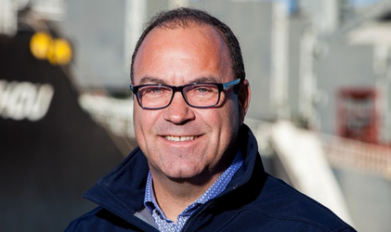Enhancing Atlantic Canada’s economy through the strengthening of our workforce
Kevin Stoddart interviewed Denis Caron, President and CEO of the Belledune Port Authority, in fall 2019 to gain insights as to how Atlantic Canada can become more globally competitive and strengthen our economic outlook.
With 30 years of experience in public service and community development, including his roles as Deputy Minister of Local Government and Environment and Deputy Minister of Economic Development, Caron has unique insights on the region’s strengths. He shares his perspectives on our urban-rural divide, embracing immigration to grow our base, and how we can gain a competitive edge in appealing to millennials in the labour market.
Q: As the President & CEO of the Port of Belledune, you have a unique perspective on the success of organizations in Atlantic Canada’s rural communities. What are some of the current opportunities and challenges these businesses face in terms of economic growth?
A: For one, governments seem less focused on regional economic development and more on key sectors of the economy. It also strikes me that we are not doing as much as we could be in terms of value-added production in our resource-based sectors. Take forestry, for example. After the crash of 2008, many pulp and paper plants that were operating in northern New Brunswick shut down. Some of that was related to the markets, but a major issue was productivity due to a lack of automation and capital investments, which prompted many of these larger organizations to pack up and move elsewhere.
Hindsight being 20/20, we should have had government policies in place to ensure that companies were reinvesting profits in technology and other capital. And we need that going forward. I think we sometimes forget that when we allow others to take our resources, process them, and make products, they can pull up stakes when things go wrong. The thing is there are extraordinary examples of value-added products in our heritage. Look at McCains, or the Irving refinery in Saint John, which is the largest of its kind Canada and one of the largest in North America. Irving is importing product, processing it, and shipping it back out again. We need to be doing more of that in other industries.
I’ll give you an example of what is possible when you make those investments. About 15 years ago in New Brunswick, there was rationalization of sawmills. Many small operations did not have the technology, or the knowledge, to develop new markets. Over time, new players came into the area, acquired more crown land, and built sophisticated sawmills. As a result, the associated job opportunities have evolved from mainly general labour to those requiring the skill to operate and troubleshoot computerized equipment. Investing in technology and innovation to keep pace with change and create attractive job prospects needs to happen in more sectors.
Q: It seems that the kind of urban-rural divide we have traditionally seen in Atlantic Canada has become more of a global conversation. Given that you live and work in rural New Brunswick, what are your thoughts on this divide—has it gotten worse in recent years or has it improved? Do you see opportunities for urban and rural areas to work together for the benefit of our region?
A: We have a vested interest in working together to make Atlantic Canada’s economy better, whether you are living in Moncton or Belledune. There are economic opportunities in our rural areas that can enable them to contribute to our region’s growth. They may be resource-based, but we need more understanding and appreciation of these opportunities so we can work together to develop them.
This could be facilitated through government policies, but even so, we need to determine whether we have the right policies in place to address the current need, if we have dedicated people within public service who are able to make progress on this front, and if there is the collective will among the business community to play a role in this effort.
The challenge is that it is difficult to put policies or a strategic plan for development in place given that governments change. In New Brunswick, the last three governments have been one-term, so there is a tendency to look at short-term and near-term objectives because they are easier to achieve, as opposed to medium and long-term ones that will sustain our economies.
Ultimately, the challenge is that our urban centres have more action going on because they are home to our universities, government offices, and other organizations and institutions. If we want to ensure the success of our rural areas, we need to look at how we can apply new technologies to enhance their current business activity or, better yet, encourage innovative thinking in the kind of businesses rural communities can attract or foster. For example, if you are a business consultant, you don’t necessarily have to be based in downtown Halifax. I know a world-renowned wood pellet consultant who chooses to make his home in Bethel, Maine, which has a population of about 500 people. Stories like these demonstrate that there are opportunities for all regions to thrive. We just need to identify ways we can work together to make that happen.
Q: The urban/rural divide is one thing, but what about the divide at the provincial level? Based on your experience in economic development, how do we bring four provinces together to achieve mutual success?
A: It starts with our political leaders. They must make it a priority because we have considerable strengths as a region. Take research and development. Each province is focused on that in its own way, and there is a lot of activity going on, but why not open up those investments and projects and give all four provinces a chance to support them?
At the same time, business leaders need to step up. We have prominent businesses and business families that are not only leaders in Canada but in the world in their respective industries—Sobeys, Irving, McCain. They could bring more leaders to the table to talk about how we come together as a region. After all, government can enact policies or put regulations in place that support economic development, but the real catalysts of that activity are the members of our private sector.
Q: Let’s talk about talent. What are some of the challenges or opportunities you see with regard to attracting the necessary talent our companies, particularly in rural areas, need to grow?
A: For one, we should be targeting people who moved away to find work. The biggest surprise for me is that there are a lot of young people who want to come back, a fact that has worked in our favour as we’ve been able to entice top talent to the Port over the past two years. These are people who are in their late 20s or early 30s, they have nearly a decade of experience, and they are starting families. Living in larger centres without extended family support is challenging when you have a young family. If we create really interesting opportunities and businesses here, we can take advantage of that desire to come back home.
We also need to be more innovative and creative in our approach to all aspects of attraction and retention. We could build more flexibility into positions to accommodate work-life balance or enable more people to work from home. We could also give people more responsibilities and increase investments in employee learning and growth. But I think we should really focus on immigration as a means of growing our workforce. Reports suggest that approximately 5,000 thousand newcomers have settled in New Brunswick in recent years, which is good, considering our aging and decreasing population. But we need to increase those numbers if we want sustainable economic growth in Atlantic Canada.
Q: In that light, there seems to be a perception that our region is very friendly, but not very welcoming. Do you agree with that assessment and what can we do from a hiring or cultural perspective to be more welcoming to new Canadians?
A: I believe Atlantic Canada is becoming more welcoming, in general. There was a time when newcomers to our rural areas would eventually gravitate to Montreal, Toronto, or even Halifax. But over the past five to 10 years, I’ve noticed that more immigrants are staying in our rural areas because Atlantic Canadians are making an extra effort to engage and integrate newcomers. There are always going to be bumps along that road, but it is in our best interests to make this work. By being more involved, better informed, and making more effort to understand and welcome different cultures, we can grow those numbers and offset the demographic shifts we are seeing here.
Let’s not forget we have a real advantage in making that happen. We are attracting many international students to Atlantic Canada’s universities. That creates opportunities to connect with and keep them, so they apply the skills they are learning for the benefit of our economy. It also means they become their families are more likely to settle here, but our goal should be to retain the individuals who are training in our region.
Q: What should Atlantic Canada’s rural CEOs be doing to create organizational cultures that encourage people to stay?
A: I’ll give you an example from my own experience. We had a young woman from Iran working with us this past summer. She is studying Geographic Information Systems, which is the expertise we need, but she comes from a large city in Iran, and this is a small community with a culture that is predominately English and French. So our thinking was, ‘Why would she want to come to rural New Brunswick to work for us?’ As it turned out, she loved the fact that she did not have to live in a big city and could get to know her neighbours and her work colleagues. And she did such a fantastic job for us that we have hired her on as a student employee.
This is what happens when you are open to new cultures and new Canadians. I don’t think my generation is as open as it should be, but millennials very much are, and I think business leaders need to follow their example. We need to reach out and give new Canadians opportunities to gain experience because when we get over our reluctance and embrace new people, it really is very enriching for everyone involved.
Q: What do you predict will be the defining challenges for rural Atlantic Canada’s workforce and economic landscape over the next five to 10 years?
A: Our companies need to evolve, whether through investments in technology, enhanced productivity, or market development. Business is much more global than it was 20 to 30 years ago, and I think our business leaders need to look more closely at how they take on that challenge.
That will require capital investments, but mostly it will require human capital, so our companies must offer interesting opportunities to attract and retain talent, particularly young people. That is what this demographic wants, and it doesn’t matter whether those opportunities are in rural or urban New Brunswick. Given that there are more of these opportunities in our urban centres, as a region, we need to look at our assets and see how we can develop our rural companies so that they are more competitive on the global stage.
We need to be more creative in general in our approach to attracting and retaining talent. The internet provides a spotlight on the world. You can travel virtually anywhere online and get a strong sense of what is going on or communicate with people in every country. That is an opportunity to promote our rural areas. After all, as nice as it is to live in a big city, it is truly rewarding to know you can get away from work and spend quality time with your family or friends doing other things. Rural areas tend to facilitate that sense of escape, and that has a value in an era when we spend a lot of time at work or thinking about it. For that reason, I’m very optimistic about the future development of Atlantic Canada’s rural areas. We just need political and business leaders who will commit to developing and growing these areas, and Atlantic Canada, in ways that go beyond what we have been doing for the past 20 to 30 years.
I look at the Port as an example of what we can achieve. We’re seeing very good growth, we are attracting top talent, we are providing jobs that are extremely interesting, and giving employees invaluable experience. But more than that, we are competitive and giving our people reasons to stay with us because we do not want to be a training ground for someone else.
About Atlantic Leader Insights
Atlantic Canada’s economy is fueled by a diverse array of private and public sector entities that employ thousands of people and contribute to our region’s growth and prosperity. But how are these organizations optimizing the potential of their people, and what insights have they gained about the future of our economy from their innovative initiatives?
KBRS recognizes the critical importance of attracting, developing, and retaining inspiring leaders and top talent within Atlantic Canada. We sat down with leaders at several high-impact Atlantic Canadian organizations to talk about our region’s opportunities and challenges. This article is one in a series that aims to collect these leaders’ insights on how we can enhance our economic outlook by strengthening our workforce.

President and CEO, Belledune Port Authority




















